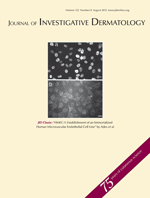J Invest Dermatol:抑制GSK3β阻断黑色素瘤细胞转移
2012-07-27 Beyond 生物谷
糖原合成酶激酶-3(glycogen synthase kinase-3,GSK-3)是一种多功能的丝氨酸/苏氨酸蛋白激酶,是细胞内多种信号转导通路中的重要成分,不仅参与细胞内糖代谢过程而且还参与细胞增殖、细胞分化和细胞凋亡等多种重要生理过程。 一项最新研究主要集中于分析糖原合酶激酶(GSK)-3β信号在黑色素瘤中的作用。免疫组化染色显示在原位和转移性黑色素瘤组织中GSK3β的表达分别为12和3
糖原合成酶激酶-3(glycogen synthase kinase-3,GSK-3)是一种多功能的丝氨酸/苏氨酸蛋白激酶,是细胞内多种信号转导通路中的重要成分,不仅参与细胞内糖代谢过程而且还参与细胞增殖、细胞分化和细胞凋亡等多种重要生理过程。
一项最新研究主要集中于分析糖原合酶激酶(GSK)-3β信号在黑色素瘤中的作用。免疫组化染色显示在原位和转移性黑色素瘤组织中GSK3β的表达分别为12和33%。
研究发现GSK3抑制剂及小干扰RNA(siRNA)降低GSK3β表达能抑制黑色素细胞的运动能力,这一效应在划痕实验、三维胶原蛋白植入球体以及改良Boyden小室实验中检测到。
进一步探究证实抑制GSK3β信号降低N-cadherin的mRNA和蛋白表达水平,同时转录因子Slug的表达也下降。抑制GSK3β信号也能抑制黑色素细胞与内皮细胞和成纤维细胞之间的黏附,防止黑色素瘤细胞跨内皮迁移,而一旦恢复N-cadherin表达,上述效应被逆转。
GSK3β信号在黑色素瘤粘附中的作用主要通过调控粘着斑激酶(FAK)的磷酸化。总之,GSK3β通过影响N-cadherin和FAK调节黑色素细胞的运动性和侵袭能力。这些研究表明,抑制GSK3β是一种潜在的黑色素瘤治疗方法。
编译自:GSK3β Inhibition Blocks Melanoma Cell/Host Interactions by Downregulating N-Cadherin Expression and Decreasing FAK Phosphorylation

doi:10.1038/jid.2012.237
PMC:
PMID:
GSK3β Inhibition Blocks Melanoma Cell/Host Interactions by Downregulating N-Cadherin Expression and Decreasing FAK Phosphorylation
Jobin K John, Kim H T Paraiso, Vito W Rebecca, Liliana P Cantini, Ethan V Abel, Nicholas Pagano, Eric Meggers, Rahel Mathew, Clemens Krepler, Victoria Izumi, Bin Fang, John M Koomen, Jane L Messina, Meenhard Herlyn and Keiran S M Smalley
This study addresses the role of glycogen synthase kinase (GSK)-3β signaling in the tumorigenic behavior of melanoma. Immunohistochemical staining revealed GSK3β to be focally expressed in the invasive portions of 12 and 33% of primary and metastatic melanomas, respectively. GSK3 inhibitors and small interfering RNA (siRNA) knockdown of GSK3β were found to inhibit the motile behavior of melanoma cells in scratch wound, three-dimensional collagen–implanted spheroid, and modified Boyden chamber assays. Functionally, inhibition of GSK3β signaling was found to suppress N-cadherin expression at the messenger RNA and protein levels, and was associated with decreased expression of the transcription factor Slug. Pharmacological and genetic ablation of GSK3β signaling inhibited the adhesion of melanoma cells to both endothelial cells and fibroblasts and prevented transendothelial migration, an effect rescued by the forced overexpression of N-cadherin. A further role for GSK3β signaling in invasion was suggested by the ability of GSK3β inhibitors and siRNA knockdown to block phosphorylation of focal adhesion kinase (FAK) and increase the size of focal adhesions. In summary, we have, to our knowledge, demonstrated a previously unreported role for GSK3β in modulating the motile and invasive behavior of melanoma cells through N-cadherin and FAK. These studies suggest the potential therapeutic utility of inhibiting GSK3β in defined subsets of melanoma.
本网站所有内容来源注明为“梅斯医学”或“MedSci原创”的文字、图片和音视频资料,版权均属于梅斯医学所有。非经授权,任何媒体、网站或个人不得转载,授权转载时须注明来源为“梅斯医学”。其它来源的文章系转载文章,或“梅斯号”自媒体发布的文章,仅系出于传递更多信息之目的,本站仅负责审核内容合规,其内容不代表本站立场,本站不负责内容的准确性和版权。如果存在侵权、或不希望被转载的媒体或个人可与我们联系,我们将立即进行删除处理。
在此留言








#GSK3#
70
#GSK3β#
0
#黑色素瘤细胞#
84
#EST#
72
#阻断#
68
#色素#
82
#细胞转移#
107
#黑色素#
104
#黑色素#
56